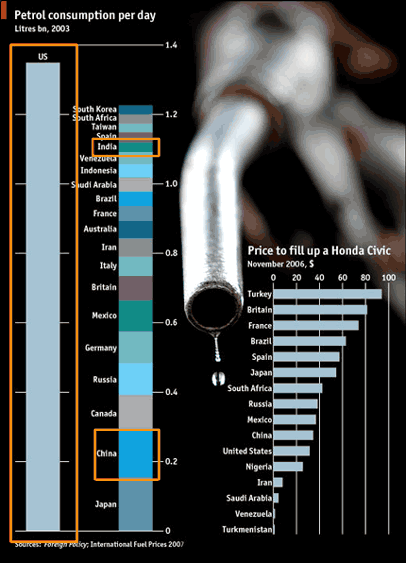The western media is making increasingly shrill noises about the growing threat of emissions from China and India while completely ignoring the scale of emission that goes on in their own backyard.In an increasingly environmentally aware world China and India are becoming the new villains. Every other day there's a news report highlighting the growing might of the two countries and the harm they are set to unleash on the environment.
Lets take
this post, as an example. Made by our friends at AutoblogGreen, it announces that
"Low cost Indian cars could be environmental disaster." What caught my attention is not that it ignores India's adoption of tough Euro emission norms which are more stringent than EPA standards of US. Nor that it disregards that Tata's upcoming air car will emit anywhere from 25% to less than 1% of CO2 per km compared to an internal combustion engine gasoline car (more on that in next post). What I find most interesting is that there's no acknowledgment of the environmental harm done by cars in the west
today while pointing to the
future "environmental disaster" to be caused by Indian cars.
The problem with the China and India argument is that it's disproportionate. It's made to move people's attention away from far greater environmental crimes that are being perpetrated in the west. Here is an apt example from automotive industry itself which is representative of total emissions. In 2005, the United States produced around 12 million cars. India, on the other hand, produced just 1.6 million. In other words, the U.S. with less than 1/3rd population of India, produced 7.5 times the number of cars. If we adjust the figure by population,
US is around 23 times worse than India! I should mention here that these are production figures, not sales (
see source PDF). India's share should actually be less than this since some of the cars were for exports. We export
more cars than China, whereas US doesn't do much car exports if I'm correct. I'm not even going to compare the size of Indian cars (an estimated 80% of our cars are small cars compared to 15% in US) or their efficiency (estimated around 50% higher than US) or the historical automotive production (more than 100 years in US vs. 25 in India). Let's just say that it will take a long time for us to catch up to the level of "disaster" US cars are unleashing over the environment right now.
This is not to say that India should not do all it can to avoid reaching that scale. The point is, emissions on a much larger scale are caused in U.S. today and therefore it should be the last country to point a finger at China and India. Climate change is a global problem and all emissions are bad regardless of where they are caused. What the world needs from the U.S. is leadership in cutting down dramatically on emissions, not finger pointing.
I've covered the India and China argument in the past on this blog without directly referring to it. The George Monbiot interview I pointed out recently touched upon it when Monbiot attacked the interviewer's contention that China is a big problem by
saying:
For us to turn to the Chinese and point the finger at them and say they are the problem, we have to become hypocrites on a scale that's almost unprecedented. I mean, the Chinese at the moment produce 2.7 tons of carbon per year. Canadians produce 19 and the Americans 20.
Don Brown, a U.S. scientist at IPCC, who has worked on the moral and ethical dimensions of climate change holds a
similar view:
What are the other issues. Well, the issue of no country has to do anything until everyone else [India and China] does something, okay. That's the third excuse, unfortunately my country has been using for twenty years. We don't have to do anything until everyone else does something. That's a moral issue. Can a co-criminal decide that they don't have to stop their crime because the other co-criminals haven't stopped doing it? As a matter of moral and ethics, we believe that that excuse is also morally bankrupt.
UPDATE 13-Jul: Autobloggreen added
a response to this post a few days ago. It admitted that decision made by US in the past were unsustainable but the author still did not recognise the difference between the *scale* of emissions caused in US vs. China or India.

A
new post made yesterday finally demonstrates the scale that I was talking about.
Looking at this shocking graph with US on the left and a bunch of countries on right, no one can argue that China and India pose an "environmental disaster" in the near future.
At least not without first acknowledging the environmental disaster that US is today.
UPDATE 15-Jul: Sunita Narain, noted environmentalist, editor 'Down to Earth' magazine and head of Centre for Science and Environment (CSE), shares similar thoughts in her magazine
editorial from May-31:
"Currently, two things are happening. One, China and India are being projected as the new villains—they pollute; they will increase emissions; they don’t want legally binding commitments and are, therefore, blocking global negotiations."
She goes on to raise some important points and concludes that the developing world must force rich nations to make the necessary reductions in emissions.


 A
A